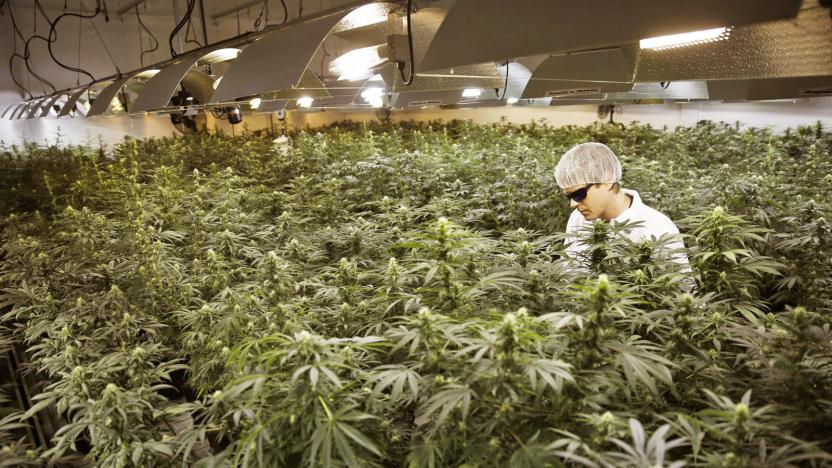DrugEnforcementAdministration
Latest

US government wants you to grow weed for science
Citizens hoping the US government would smile upon recent requests for deregulation, today is not your day: it will remain an illegal, schedule 1 controlled substance. But all is not lost, as the DEA announced it's allowing more organizations to grow and distribute marijuana -- just so long as it's for research purposes.

The DEA's eavesdropping has tripled over the past decade
A federal agency eavesdropping is nothing new -- even if sometimes they do it with controversy. But, aside from the NSA, there's one in particular that has been quite active in the past few years: the Drug Enforcement Administration. According to records obtained by USA Today, thanks to the Freedom of Information Act, the DEA more than tripled its use of wiretaps (and other electronic tools used for snooping) over the last decade. As of last September, it had recorded 11,681 intercepts, compared to 3,394 made 10 years earlier. That's not the most interesting part about the report, however.

The DEA's using powerful spyware for surveillance too
The war on drugs has a surprising soldier amongst its ranks: Italian spying software. As Motherboard's sources tell it, the Drug Enforcement Administration's dropped $2.4 million on surveillance tools that are capable of intercepting phone calls, texts, social media messages, and can even take hold of someone's webcam and microphone. Oh, Remote Control System (as its officially called) can grab passwords, too. Almost sounds like a video game, right? The Hacking Team-developed software (the outfit behind Ethiopian cyberattacks on US journalists), can be installed on the sly and grants access to data that may very well be encrypted or otherwise inaccessible by other means. It comes hot on the heels of news that the DEA's been collecting phonecall metadata for an awfully lot longer than the NSA, too. Naturally, no one on either side of the story has been eager to open up to Motherboard, and presumably journalists in general.

DEA kept records of US phone calls for nearly 15 years
The NSA isn't the only American government agency keeping track of phone call metadata... or rather, it wasn't. A Department of Justice court filing has revealed that the Drug Enforcement Administration maintained records of every call made from the US to Iran and other nations for nearly 15 years, stopping only when the initiative was discontinued (prompted at least partly by leaks) in September 2013. The DEA didn't get the content of those calls, but it also didn't get court oversight -- it used administrative subpoenas that only required the approval of federal agents. And unlike the NSA, this program was meant solely for domestic offenses like drug trafficking.

Facebook wants the DEA to promise that it won't create fake accounts
Remember how the DEA got caught impersonating a woman on Facebook in an attempt to catch criminals who contacted her? Yeah, Facebook isn't at all pleased. It just sent a letter asking the anti-drug agency to promise that it won't create fake accounts or otherwise stomp all over the social network's terms of service. As the site argues, the DEA's moves "threaten the integrity" of its user base -- the point of Facebook's real identity policy is to foster trust, and sting operations violate that trust. Law enforcement isn't above this rule, the company says. It's not certain if the letter will have any effect; the Justice Department tells BuzzFeed News that it doesn't believe this trickery happens frequently. Whether or not that's true, it's safe to say that Mark Zuckerberg and crew have set some firm boundaries for future cases. [Image credit: Tim Sloan/AFP/Getty Images]

DEA says it can't intercept iMessage chats
Apple mentioned back in 2011 that iMessage used encryption to safeguard conversations, but we've never had an exact understanding of how deep the security layer goes. It's deep enough to stymie interception attempts at the DEA, according to an intelligence note gleaned by CNET. The agency warns its staff that it's "impossible" to tap the messages through usual methods -- great for privacy, but a worry for law enforcers. There isn't much that officials can do, either, short of discovering a clever in-the-middle attack or enacting proposed changes to the law that would mandate backdoor access. And before you ask: BlackBerry Messenger isn't necessarily as secure. While BES-based BBM chats are largely locked down, there's a common encryption key for all BlackBerrys that makes it relatively easy to crack regular BBM discussions. We wouldn't assume that any digital communication is completely private, but iMessage may have come closer to the target than most.

Apple's iMessage encryption thwarts government investigations
The encryption used by Apple's iMessage service is hindering federal drug enforcement agency investigations, says a report in CNET. CNET obtained an internal Drug Enforcement Administration document that details the problem faced by agents who are tracking suspects using non-traditional communication methods. According to the document, the end-to-end encryption used by iMessage makes it "impossible to intercept iMessages between two Apple devices," even when there is a court order authorizing the electronic wiretap. This problem was discovered when agents noticed that messages sent from one iPhone to another iPhone via iMessage were not being captured during a surveillance. The inability to adequately conduct surveillance is a growing problem for law enforcement. FBI director Robert Mueller recently told Congress that "there is a growing and dangerous gap between law enforcement's legal authority to conduct electronic surveillance, and its actual ability to conduct such surveillance." He asked Congress "to ensure that the laws by which we operate and which provide protection to individual privacy rights keep pace with new threats and new technology."




